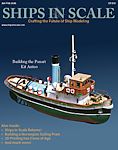Hallo,
I am talking about https://www.arbeitskreis-historischer-schiffbau.de/.
I'm too new to know, sorry.
I am talking about https://www.arbeitskreis-historischer-schiffbau.de/.
I'm too new to know, sorry.
 |
As a way to introduce our brass coins to the community, we will raffle off a free coin during the month of August. Follow link ABOVE for instructions for entering. |
 |
 |
The beloved Ships in Scale Magazine is back and charting a new course for 2026! Discover new skills, new techniques, and new inspirations in every issue. NOTE THAT OUR FIRST ISSUE WILL BE JAN/FEB 2026 |
 |
Moin my friendMoin as we say - Hello!
Kind regards from the most beautiful city in the world - Hamburg / Germany ;-)) My greatest interest so far has been the ship models from Wiking in 1: 1250. The largest free site about these models was created over time, https://www.wiking-schiffsmodelle.de/. A few years ago I was able to assist Paul Jacobs, a truly great specialist in scale waterline models, with his book Miniature Ship Models, for the area of wiking. Maybe someone knows him? I have always been enthusiastic about historical ship models and working with wood. However, always with the background of historical accuracy as far as possible. I practiced on plastic models as well as cardboard models. Now a wooden Spanish chebec, dating from 1750, lies on the slipway. We will see...
Thank you for a friendly welcome.

Vielen Dank - thanks a lot, very kind
Another log shouldn't be that very interesting. There are some very good ones, such as dean's. I started building and didn't discover SoS until later. Construction is currently on hold. A hand injury has to heal before it can continue. In addition, I still have the as yet unsolved problem of how the dinghy was lowered into the water. There is no information about it. I suspect that the previous construction is not correct.Welcome aboard.
It willbe super when you create a building log for the Spanish Chebeq.
Maybe it will look like this one.
View attachment 260337
MoinMoin as we say - Hello!
Kind regards from the most beautiful city in the world - Hamburg / Germany ;-)) My greatest interest so far has been the ship models from Wiking in 1: 1250. The largest free site about these models was created over time, https://www.wiking-schiffsmodelle.de/. A few years ago I was able to assist Paul Jacobs, a truly great specialist in scale waterline models, with his book Miniature Ship Models, for the area of wiking. Maybe someone knows him? I have always been enthusiastic about historical ship models and working with wood. However, always with the background of historical accuracy as far as possible. I practiced on plastic models as well as cardboard models. Now a wooden Spanish chebec, dating from 1750, lies on the slipway. We will see...
Thank you for a friendly welcome.

What happened to "wiegates innen"?Moin Manni, or better "Grüß Gott" send from a Bavarian in Austria
also from my side a warm welcome here on board of our forum.....
“Wie gehts Ihnen” is a bit formal don’t you think?What happened to "wiegates innen"?
I lived in Germany 6 years and we usually greeted with wiegates....“Wie gehts Ihnen” is a bit formal don’t you think?
Thank you for asking. Unfortunately, healthwise not so good. It's called heart failure. The whole life is strongly affected. Strong medications with corresponding side effects are unfortunately necessary to be able to work on the model at least from time to time.What happened to "wiegates innen"?
Hello Wolle. Not quite. I come from Hamburg, live in northern Germany. You can recognize the "foreigner" immediately by the "Moin moin". Correctly it means only "moin", everything else is an unintentional speech.Formal, yes, but not unusual. We say that often in Germany. “Moin Moin, Wie geht es Dir” is what we say in Northern Germany.


Moin, Wolle. That is then an unforeseen stroke of luck. To most readers here this should be unknown, Austrians, Bavarians, Americans, etc..Hello to Hamburg. You're not that far away. I come from Stade. Of course I know that it just means "Moin" but I also like it when you say "Moin Moin". In general, I really like the Low German language and I can do it a bit. Unfortunately, this beautiful language is slowly dying out.
